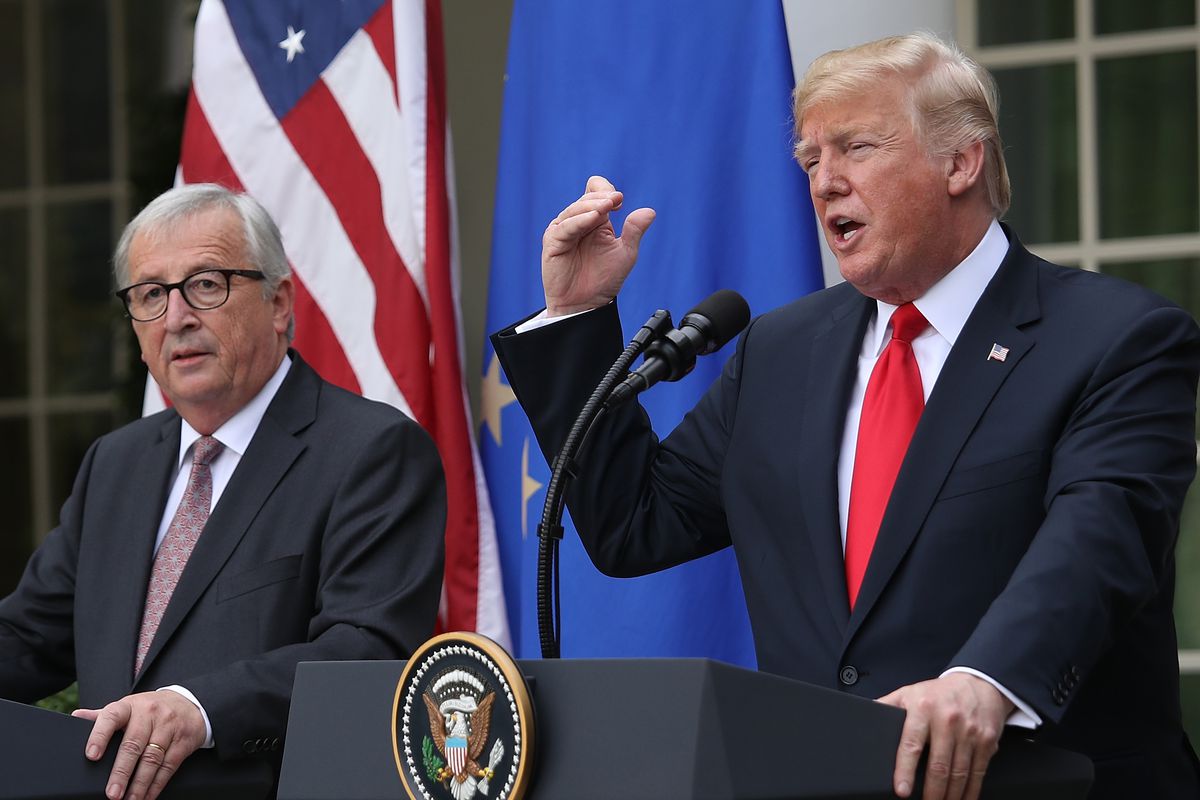European carmakers surged after President Donald Trump and European Commission President Jean-Claude Juncker agreed to declare a ceasefire in their trade spat while they negotiate lower barriers to transatlantic commerce.
Shares of BMW AG, Volkswagen AG, Fiat Chrysler Automobiles NV and Daimler AG jumped on Thursday following a pledge from the two leaders to “hold off on other tariffs” while they negotiate a deal to expand European imports of U.S. liquefied natural gas and soybeans and lower industrial tariffs
In the biggest sign yet that a major trading partner can convince the U.S. to back away from a trade war, Juncker also said they would re-examine U.S. steel and aluminum tariffs and the retaliatory duties imposed by the EU.
“We had a big day, very big,” Trump said during a press conference with Juncker at the White House on Wednesday. “We are starting the negotiation right now, but we know where it is going.” Trump hailed “a new phase” of trade relations.
The deal eases tensions stoked by Trump’s threat to impose new tariffs on car imports. BMW climbed as much as 5.5 percent on Thursday and was up 2.7 percent in Frankfurt as of 9:31 a.m. Volkswagen was 3.6 percent higher and Daimler up 0.4 percent. Fiat traded 4.7 percent higher in Milan.
Trump warned at a cabinet meeting last week that he would move forward with 25 percent auto tariffs if the meeting with Juncker didn’t go well. Trump could impose car tariffs on national security grounds once Commerce Secretary Wilbur Ross completes a required investigation, which could come anytime before a deadline by early next year.
Auto tariffs at the level Trump has threatened would add about 10,000 euros ($11,700) to the sticker price of a European-built car sold in the U.S., according a European Commission assessment obtained by Bloomberg News last month. That would cut U.S. imports of European cars and car parts in half, the commission forecast.
Trump on Wednesday said they would try to “resolve” steel and aluminum tariffs he imposed earlier this year and retaliatory duties the EU levied in response. The U.S. and EU also will work together to reform the World Trade Organization and address unfair trading practices, they said in a joint statement.
Trump and Juncker took no questions after their brief remarks in the Rose Garden, an impromptu appearance scheduled after about three hours of talks.
In a speech after his White House visit, Juncker said the deal may lead a reassessment of metals tariffs “in due course” after the U.S. imposed duties on steel and aluminum on national-security grounds. “We agreed that if we’re making sufficient progress on other issues this can be done from one day to another,” he told reporters after the speech.
The truce may prove to be short-lived if the two sides can’t resolve their differences over trade in vehicles and car parts. In May, Trump abandoned a framework for trade negotiations with China within days of it being announced, before ratcheting up tariffs.
‘‘They sold it as something very positive, but for me the announcement is not as big for now, because it’s kind of a semi-truce,” Marie Kasperek, associate director of the global business and economics program at the Atlantic Council, said by phone. “As long as the steel and aluminum tariffs are ongoing, the EU will not negotiate on a high-level basis.”
Trump says a 10 percent tax on imports of cars to the EU is too high compared with the 2.5 percent rate charged by the U.S., and he’s also been critical of the EU over its $150 billion trade surplus with the U.S.
Still, the deal announced Wednesday with the EU is an encouraging sign that America’s trade partners may be able to placate the Trump administration with offers to buy more U.S. goods, averting a trade war that the International Monetary Fund has warned may undermine the strongest global upswing in years.
The Alliance of Automobile Manufacturers, a group of major automakers that includes General Motors Co. and Toyota Motor Corp., welcomed the effort to negotiate a solution that will lower trading barriers, rather than increase them. “Today’s announcement demonstrates that bilateral negotiations are a more effective approach to resolving trade barriers, not increasing tariffs,” the alliance said in a statement.
Cautious optimism also came from Republican lawmakers who’ve grown worried about Trump’s trade strategy.
“It’s going to help defuse some of the concern out there, not only in farm country but in our economy generally,” said Senator Rob Portman, an Ohio Republican. “It’s a first step. We’ve still got to work out the details. But it’s been hard these last few weeks to see any light at the end of the tunnel,” with no signs of progress with the EU, Mexico, Canada or China.
Juncker came to Washington for a last-ditch bid to avoid U.S. tariffs on cars. He told reporters he entered Wednesday’s meeting with the intention of reaching an agreement with Trump.
“We agreed that no other tariffs would be introduced as long as we are in the negotiations,” Juncker said during a speech in Washington after his press conference with Trump. “I’m happy that we agreed to this agreement today.”
